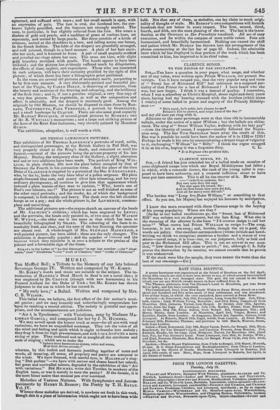CLARENCE SONGS.
TO THE EDITOR OF THE SPECTATOR.
SIR,-You have a question in your paper, what songs, and whether any of any value, were written upon Prince WILLIAM, our present So. vereign. Can it have escaped you, that the very popular song and tune of " Sweet lass of Richmond Hill" had reference to a supposed par- tiality of that Prince for a lass of Richmond ? I have heard who she was, but now forget. I think it was a damsel of quality. I remember, when I was a schoolboy at Christ's Hospital, about eight-and-forty years since, having had my hearing stunned with the burthen (which alone I retain) of some ballad in praise and augury of the Princely Midship- man :-
" He's royal, he's noble, he's chosen by me ,e
Britain's Isle to protect, and reign Lord of the Sea 1"
and my old ears yet ring with it.
Allusions to the same personage were at that time rife in innumerable ballads, under the notion of a sweet William ; but the ballads are oblite- rated. The song of " Sweet William Taylor, walking with his lady gay" —from the identity of names, I suppose—usually followed the Neptu- nian song. The late Tom SHERIDAN bears away the credit of this. But was it possible he could have been the author of it in 1782 or 1783 ? Perhaps he made it his own by communicating a deeper tinge of vulgarity
to it, exchanging " for " Billy." I think the rogue snugged
it in as his own, hoping it was a forgotten ditty. C. L. _• It is Neptune who predicts this.
CLARENCE SONGS, NO. II. StR,—A friend has just reminded me of a ballad made on occasion of some shipboard scrape into which our Royal Midshipman had fallen ; in which, with a romantic licence, the rank of the young sailor is sup- posed to have been unknown, and a corporal infliction about to have been put into execution. This is all he can recover of it. He was —" order'd to undress, Sir 1
But very soon they did espy The star upon his breast, Sir : And on their knees they soon did fall, And all for mercy soon did call."
The burden was "Long live,Duke William," or something to that effect. So you see, his Majesty has enjoyed his laureate by anticipation. C. L.
I know the town swarmed with these Clarence songs in the heyday of-his young popularity. Where are they ?
[So far as our ballad recollections go, the "Sweet lass of Richmond Hill" was written not on the present, but the late King. What else is the meaning of the allusion in the lines " I'd crowns resign to call her mine ?" What crown had Prince 'WILLIAM to resign P—The song, however, is not a sea-song ; and, besides, though the air is goad, the words-are Paltry.' Our excellent correspondent (whose initials and hand. writing we think we recognize) mentions a burden and a stanza of two others—naval songs, it is true—but, to our judgment, fully as bald and poor as the Richmond Hill affair. -This is not an answer to our ques- tion;'" fiitiv these best songs came to perish ;" for, although C. L. fully proves the destruction by its remains, we cannot concede that lie proves it was undeserved.
If the stock were like the sample, they were neater the worst than the best of our sea-songs.—Eol


























 Previous page
Previous page